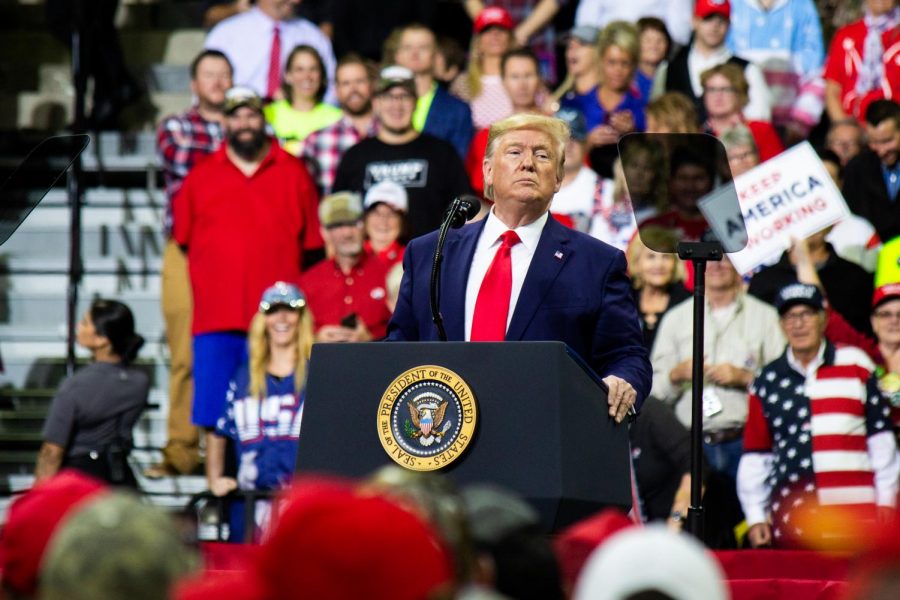House impeaches Trump for second time, Senate impeachment trial set to take place after inauguration
Nikolas Liepins/The Rubicon, with the NSPA Campaign 2020 Photo Exchange project
The House of Representatives voted 232-197 to impeach President Donald Trump for “incitement of insurrection” on Wednesday after a mob of his supporters, incited by his false claims of election fraud, violently breached the U.S. Capitol on Jan. 6, resulting in several deaths.
January 13, 2021
The House of Representatives voted 232-197 to impeach President Donald Trump for “incitement of insurrection” on Wednesday after a mob of his supporters, incited by his false claims of election fraud, violently breached the U.S. Capitol on Jan. 6, resulting in several deaths.
Trump made history as the first president to have ever been impeached twice; he was impeached for the first time in December 2019 but later acquitted by the Senate and did not face removal from office.
Although Trump is now impeached again, he will still hold office until power is transferred to president-elect Joe Biden next Wednesday, and the Senate has yet to convict him of the charges brought against him. Impeachment is a two-part process: after the House votes in favor of impeachment and sends the articles — in this case, a singular article — of impeachment to the Senate, the Senate will hold a trial to either convict or acquit the president.
“I certainly think that they should convict him. It would be a good step in terms of supporting the rule of law in this country,” upper school history teacher Dr. Chris Gatto said. “Whether it will happen, I’m a little less certain about, it just depends on the Senate Republicans and whether they’re willing to move away from Trump.”
Republican Mitch McConnell issued a statement declaring that the Senate trial for Trump’s impeachment will likely not happen before Biden’s inauguration, leaving the Senate trial to the Democratic majority that will soon take over the Senate. Two-thirds of the Senate vote are needed to convict Trump and prevent him from running for U.S. political office again. If convicted, Trump would be the first president in U.S. history convicted during a Senate impeachment trial.
Freshman Mariana Ryder, who felt surprised about the quickness of the impeachment proceedings, is doubtful that the Senate will convict Trump.
“Even if [the Senate does convict him], [it] doesn’t feel like a radical change for me because I don’t think he will be running again,” she said.
Ten Republicans, members of Trump’s own party, joined with Democrats in the impeachment vote, charging him with “high crimes and misdemeanors” for his role in inciting the attack on the Capitol.
“The president bears responsibility for Wednesday’s attack on Congress by mob rioters,” said House Minority Leader Kevin McCarthy (R-Calif.) during the House impeachment hearing, despite not voting to impeach Trump. “He should have immediately denounced the mob when he saw what was unfolding.”
Immediately after his impeachment, Trump issued a video statement through the @WhiteHouse Twitter account, condemning the violence on Jan. 6 and emphasizing law and order. He also mentioned an “unprecedented assault on free speech in recent days,” most likely in response to mainstream social media outlets, including Twitter, banning him.
In preparation for Biden’s inauguration next Wednesday and potentially more violence, around 20,000 National Guard troops will be deployed to the D.C. area, Washington Metropolitan Police Chief Robert Contee said Wednesday in a press conference. Local leaders also urged citizens in a joint statement to refrain from traveling to the D.C. area for the inauguration.
“I don’t think we’ve ever had like a presidential transition like this [in modern U.S. history],” Ryan Chang (10) said. “I’ll probably be watching [the inauguration].”


















![“[Building nerf blasters] became this outlet of creativity for me that hasn't been matched by anything else. The process [of] making a build complete to your desire is such a painstakingly difficult process, but I've had to learn from [the skills needed from] soldering to proper painting. There's so many different options for everything, if you think about it, it exists. The best part is [that] if it doesn't exist, you can build it yourself," Ishaan Parate said.](https://harkeraquila.com/wp-content/uploads/2022/08/DSC_8149-900x604.jpg)




![“When I came into high school, I was ready to be a follower. But DECA was a game changer for me. It helped me overcome my fear of public speaking, and it's played such a major role in who I've become today. To be able to successfully lead a chapter of 150 students, an officer team and be one of the upperclassmen I once really admired is something I'm [really] proud of,” Anvitha Tummala ('21) said.](https://harkeraquila.com/wp-content/uploads/2021/07/Screen-Shot-2021-07-25-at-9.50.05-AM-900x594.png)







![“I think getting up in the morning and having a sense of purpose [is exciting]. I think without a certain amount of drive, life is kind of obsolete and mundane, and I think having that every single day is what makes each day unique and kind of makes life exciting,” Neymika Jain (12) said.](https://harkeraquila.com/wp-content/uploads/2017/06/Screen-Shot-2017-06-03-at-4.54.16-PM.png)








![“My slogan is ‘slow feet, don’t eat, and I’m hungry.’ You need to run fast to get where you are–you aren't going to get those championships if you aren't fast,” Angel Cervantes (12) said. “I want to do well in school on my tests and in track and win championships for my team. I live by that, [and] I can do that anywhere: in the classroom or on the field.”](https://harkeraquila.com/wp-content/uploads/2018/06/DSC5146-900x601.jpg)
![“[Volleyball has] taught me how to fall correctly, and another thing it taught is that you don’t have to be the best at something to be good at it. If you just hit the ball in a smart way, then it still scores points and you’re good at it. You could be a background player and still make a much bigger impact on the team than you would think,” Anya Gert (’20) said.](https://harkeraquila.com/wp-content/uploads/2020/06/AnnaGert_JinTuan_HoHPhotoEdited-600x900.jpeg)

![“I'm not nearly there yet, but [my confidence has] definitely been getting better since I was pretty shy and timid coming into Harker my freshman year. I know that there's a lot of people that are really confident in what they do, and I really admire them. Everyone's so driven and that has really pushed me to kind of try to find my own place in high school and be more confident,” Alyssa Huang (’20) said.](https://harkeraquila.com/wp-content/uploads/2020/06/AlyssaHuang_EmilyChen_HoHPhoto-900x749.jpeg)











